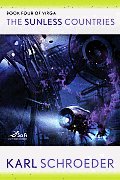
| Series: | Virga #4 |
| Publisher: | Tor |
| Copyright: | August 2009 |
| ISBN: | 0-7653-2076-2 |
| Format: | Hardcover |
| Pages: | 335 |
This is the fourth book of the Virga series, a far-future mix of sense-of-wonder SF adventure and hard SF environment building set in an artificially constructed bubble of air with artificial fusion-based suns providing light to cities that fake gravity by spinning. While starting here would mean missing getting to know the world, the introduction of a few main characters, and the slow revelation of the deeper series plot, the main risk is spoiling earlier books. The plot of The Sunless Countries itself stands on its own fairly well, bringing the reader up to speed where required.
I've been looking forward to this book since the hints of something ominous from outside Virga began in Sun of Suns. The sunless countries are those near the edge of Virga, far from the large central sun named Candesce. They are the entryway for the rare visitors from outside, the places where the Home Guard patrol, and the home of the precipice moth from Pirate Sun. (Schroeder can have a tin ear naming, as shown by both Virga and Candesce, but I thought the names he chooses for the wildlife are excellent.)
We do get all of that, and fans of Schroeder's other work won't be disappointed, but The Sunless Countries starts with a new cast of characters in a more prosaic setting, although different from previous series novels. Leal is a history tutor in the city of Sere in the region known as the Abyss. It is a town somewhat like those seen earlier in the series, spun for something approximating gravity, but it's in winter, in perpetual darkness. Leal has never seen sunlight; her world is lit by lamps, navigation is done via ropes or reckoning from travel times and a gyrocompass, and her world is poorer and harsher than the Virga we've seen before. But her immediate worry is university and national politics. A religious faction that believes that Virga is eternal and the entirety of the universe wants to ban all ideas that contradict their belief, and they're gaining support for a referendum saying that all matters of truth not immediately visible to the eye should be decided by popular vote.
Schroeder has played with governance models throughout his work, and Virga is particularly good for this since it's full of micronations. This is the first Virga book, though, where the politics are a substantial part of the plot and a substantial threat. The Eternists are a nasty parody of the war of religion on science, and (speaking as a California resident and eyeing our notorious referendum system dubiously) the twist of using direct democracy as a suppressive technique is novel and lets Schroeder make some pointed comments about the wisdom of crowds. The Eternists are a bit over the top, though. Schroeder paints the politicians as manipulative, self-serving slime, and since the protagonist is an academic, the conflict follows stock fault lines and seems pat and cliched. He makes it work within the book, but the obvious analogies outside the book are too easy and a bit distracting.
But thankfully the politics don't have to carry the book. Leal is an interesting character, with a good mix of fear and determination and a strong sense of being part of her world. Schroeder sets up a nice contrast with Hayden, returning from previous books, who has a Virga-wide view and cares about Sere and the Abyss only in the abstract. Leal sees marvels, but then goes home and lives in her world, and her moral struggle with how to do so within a political and intellectual framework she completely disagrees with is well-handled. Schroeder keeps the focus on the individuals rather than the details of the politics and the individuals are strong enough to carry me along. He also continues his excellent grasp of pacing from previous Virga books, throwing lots of events at the reader to keep the story moving.
Unsurprisingly, Leal's knowledge of history is the key to the plot. It takes a while to get there, building further tension, but we do finally find out far more about the history and nature of Virga than we had known before. The connection with the world of Lady of Mazes that I'd seen coming for a while becomes clearer, and in a particularly interesting twist, Schroeder even comes at one of the ideas of Peter Watts's Blindsight from a different angle. (Schroeder is, of course, much less depressing.) I wasn't completely taken by the set pieces that end the book, but puzzling out the history was quite satisfying and the directions in which the story is going following the revelations at the end of The Sunless Countries have a lot of potential.
The Virga series still falls a bit short of Schroeder's other work for me, but this is the most intellectually interesting entry. He moves away from steampunk set pieces and into more analysis of the nature of government and the perils and alliances of high technology. It's one of the better books in the series, although it still trails Queen of Candesce.
One warning: while the previous books of this series have done a good job of ending a story while being part of a series, this one almost ends with "to be continued." It's not quite that bad, but it's far from satisfying and doesn't resolve the main plot of the book. If that sort of thing bothers you, you may want to hold off until the next book comes out so that you can read them together.
Reviewed: 2009-12-29